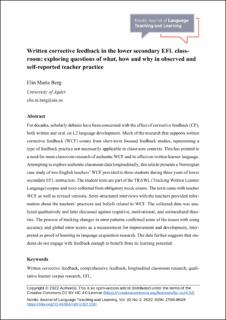| dc.contributor.author | Berg, Elin Maria | |
| dc.date.accessioned | 2023-05-16T08:48:03Z | |
| dc.date.available | 2023-05-16T08:48:03Z | |
| dc.date.created | 2023-01-18T13:08:18Z | |
| dc.date.issued | 2022 | |
| dc.identifier.citation | Berg, E. M. (2022). Written corrective feedback in the lower secondary EFL classroom: exploring questions of what, how and why in observed and self-reported teacher practice. Nordic Journal of Language Teaching and Learning (NJLTL), 10(2), 212-241. doi: | en_US |
| dc.identifier.issn | 2703-8629 | |
| dc.identifier.uri | https://hdl.handle.net/11250/3068150 | |
| dc.description.abstract | For decades, scholarly debates have been concerned with the effect of corrective feedback (CF),
both written and oral, on L2 language development. Much of the research that supports written
corrective feedback (WCF) comes from short-term focused feedback studies, representing a
type of feedback practice not necessarily applicable in classroom contexts. This has pointed to
a need for more classroom research of authentic WCF and its effect on written learner language.
Attempting to explore authentic classroom data longitudinally, this article presents a Norwegian
case study of two English teachers’ WCF provided to three students during three years of lower
secondary EFL instruction. The student texts are part of the TRAWL (Tracking Written Learner
Language) corpus and were collected from obligatory mock exams. The texts came with teacher
WCF as well as revised versions. Semi-structured interviews with the teachers provided information about the teachers’ practices and beliefs related to WCF. The collected data was analyzed qualitatively and later discussed against cognitive, motivational, and sociocultural theories. The process of tracking changes in error patterns confirmed some of the issues with using
accuracy and global error scores as a measurement for improvement and development, interpreted as proof of learning in language acquisition research. The data further suggests that students do not engage with feedback enough to benefit from its learning potential. | en_US |
| dc.language.iso | eng | en_US |
| dc.publisher | Department of Foreign Languages and Translation, University of Agder | en_US |
| dc.rights | Navngivelse-Ikkekommersiell 4.0 Internasjonal | * |
| dc.rights.uri | http://creativecommons.org/licenses/by-nc/4.0/deed.no | * |
| dc.title | Written corrective feedback in the lower secondary EFL classroom: exploring questions of what, how and why in observed and self-reported teacher practice | en_US |
| dc.type | Peer reviewed | en_US |
| dc.type | Journal article | en_US |
| dc.description.version | publishedVersion | en_US |
| dc.rights.holder | © 2022 The Author(s) | en_US |
| dc.subject.nsi | VDP::Samfunnsvitenskap: 200::Pedagogiske fag: 280 | en_US |
| dc.source.pagenumber | 212-241 | en_US |
| dc.source.volume | 10 | en_US |
| dc.source.journal | Nordic Journal of Language Teaching and Learning (NJLTL) | en_US |
| dc.source.issue | 2 | en_US |
| dc.identifier.doi | 10.46364/njltl.v10i2.1081 | |
| dc.identifier.cristin | 2109392 | |
| cristin.qualitycode | 1 | |

